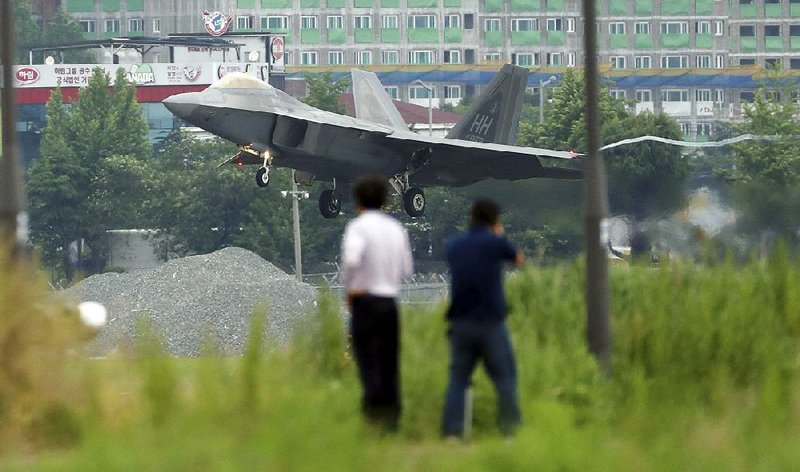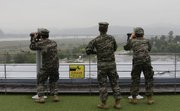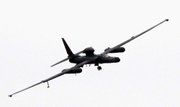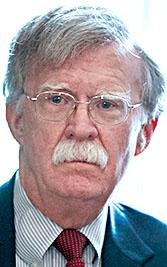WASHINGTON -- President Donald Trump said Wednesday that he will continue to insist on the denuclearization of the Korean Peninsula, despite threats from North Korean officials to cancel a June 12 summit.
Trump said North Korea has not directly told the White House that it wants to change or cancel the summit, so he has not made any decisions.
"We haven't seen anything. We haven't heard anything," Trump told a small group of reporters in the Oval Office on Wednesday, as he welcomed Uzbekistan President Shavkat Mirziyoyev to the White House. "We will see what happens, whatever it is."
When asked if he thinks North Korean leader Kim Jong Un is bluffing, Trump repeated: "We'll see what happens."
As reporters were ushered out of the Oval Office, one asked the president if he will continue to insist on the denuclearization of the Korean Peninsula. Trump responded with a simple "yes."
The North Korean regime on Tuesday protested joint U.S.-South Korea military exercises taking place in South Korea and cast doubt on the planned summit with Trump and members of his administration, scheduled for June 12 in Singapore. A North Korean official on Wednesday repeated demands that the United States stop insisting the North unilaterally abandon its nuclear weapons program and stop talking about a Libya-style solution to the standoff.
Senior officials from the two Koreas were to sit down Wednesday at a border village to discuss how to implement their leaders' recent agreement to improve ties. But hours before the meeting was to start, the North informed the South that it would "indefinitely suspend" the talks due to the U.S. and South Korea's "Max Thunder" military drills, according to Seoul's Unification Ministry.
The Unification Ministry, which is responsible for inter-Korean affairs, called North Korea's move "regrettable" and urged a quick return to talks. The South's Yonhap News Agency reported Wednesday that the U.S. won't send B-52 bombers for the military drills, citing unidentified local military and government officials.
The South Korean Defense Ministry said in a text message that the allies would proceed with the exercises as planned.
Today, the South's presidential National Security Council said it is pushing to reset talks with North Korea and will communicate closely with Washington and Pyongyang to increase the chances of a successful summit between Trump and Kim.
China, North Korea's top trading partner and ally, called on both sides to "avoid further provocation."
Foreign Ministry spokesman Lu Kang told reporters Wednesday in Beijing that North Korea and the U.S. should ensure the summit proceeds as planned and yields "substantial outcomes."
"Only in this way can we consolidate the alleviation of the situation and maintain peace and stability in the region," Lu said.
[NUCLEAR NORTH KOREA: Maps, data on country’s nuclear program]
In negotiations over the years, North Korea has repeatedly threatened to walk out over disagreements and has on occasion actually walked out. In that respect, the North's move was not surprising and underscored analysts' warnings that North Korea will not give up its nuclear weapons easily.
White House press secretary Sarah Huckabee Sanders said Wednesday that the administration is "still hopeful" that the summit will take place and that threats from North Korea to scrap the meeting were "something that we fully expected."
She said Trump is "ready for very tough negotiations" with the North, adding that "if they want to meet, we'll be ready, and if they don't that's OK." She said that if there is no meeting, the U.S. would "continue with the campaign of maximum pressure" against the North.
"We are trying to be both optimistic and realistic at the same time," national security adviser John Bolton said Wednesday morning on Fox News Radio's The Brian Kilmeade Show. "I think that's where the president is: We are going to do everything we can to come to a successful meeting, but we are not going to back away from the objective of that meeting, which is complete, verifiable and irreversible denuclearization of North Korea."
Kim Kye Gwan, North Korea's first vice foreign minister, said in a statement carried by state media earlier Wednesday that "we are no longer interested in a negotiation that will be all about driving us into a corner and making a one-sided demand for us to give up our nukes, and this would force us to reconsider whether we would accept the North Korea-U.S. summit meeting."
He criticized recent comments by Bolton and other U.S. officials who have said the North should follow the "Libyan model" of nuclear disarmament, and he took issue with U.S. views that the North should fully relinquish its biological and chemical weapons.
"Our country is neither Libya nor Iraq, which have met a miserable fate," Kim said. "It is absolutely absurd to dare compare the [Democratic People's Republic of Korea], a nuclear weapon state, to Libya, which had been at the initial stage of nuclear development."
Some analysts said that bringing up Libya, which dismantled its rudimentary nuclear program in the 2000s in exchange for sanctions relief, jeopardizes progress in negotiations with the North.
Kim Jong Un took power weeks after former Libyan leader Moammar Gadhafi's grisly death at the hands of insurgent forces amid a popular uprising in October 2011. The North has frequently used Gadhafi's death to justify its own nuclear development in the face of perceived U.S. threats.
Still, analysts said it's unlikely that North Korea intends to scuttle all diplomacy. More likely, they said, is that it wants to gain leverage ahead of the summit between Kim and Trump.
The North's reaction is more like a "complaint over Trump's way of playing the good cop and bad cop game with [Secretary of State Mike] Pompeo and Bolton," said Kim Dong-yub, a North Korea expert at Seoul's Institute for Far Eastern Studies.
Information for this article was contributed by Jenna Johnson and Anna Fifield of The Washington Post; by Hyung-Jin Kim, Foster Klug, Kim Tong-hyung, Lolita Baldor, Josh Lederman, Catherine Lucey, Jennifer Peltz and Christopher Bodeen of The Associated Press; and by Terrence Dopp, Kanga Kong and Andy Sharp of Bloomberg News.
A Section on 05/17/2018



